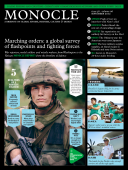
Issue 56
From war reporters to model soldiers, Monocle issue 56 reports from the frontline of defence. We join Norway’s new recruits, get kitted out with Vatican City veterans and keep a close watch on the defence industry’s moving targets.
In This Issue
Oops! No content was found.
Looks like we no longer have content for the page you're on. Perhaps try a search?
Return Home

